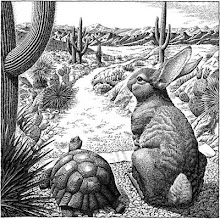-Narcissus and Goldmund by Herman Hesse (an excerpt)
This particular passage does not mirror my own beliefs. I rather like to think that all creation is done to canonize the beauty in life but see so many examples that are summed up so well by this description. Take Guernica, for example, or every Carissa's Wierd* song you have ever heard. This weighed on me pretty heavily when I first read it and thought it would be worth sharing.
(*Yes, weird is spelled incorrectly but there's a reason this group was referred to by so many
music critics as "music's spelling bee champs".)

Wait, wouldn't this passage *support* your belief - not that art is glorifying death but rather that it's an attempt to move outside it in immortalization ("canonize the beauty in life")?
ReplyDeleteAli: it only half supports my own belief really. In context he's saying that art is only created for fear of death and not for glorification of life and God. At this particular point in the novel he is faithless and dwelling on death. Later in the book he goes on to shift perspective to the celebration of life. The reason it seemed so relevant was that it did so closely resemble my own belief save for the minor distortion which means so much. Maybe I'm off base in saying that it differs but I think the difference between creation out of fear as opposed to celebration is key.
ReplyDeleteCarissa's Wierd has been on my to-listen list. It's near the top of my to-take-in list right now, right after Mark Twain's autobiography. Happily, they can be experienced concurrently, so I think I know what I plan to spin this weekend.
ReplyDeleteThis quotation is also from something I have meant to take in. Hesse is one of my great secular Virgils.
I think I may be agreeding with you and Ali: I find the death-as-muse a bit of a morbid mis-queue. It lines us up for all kinds of questions but no pure recognizable inspiration. I think sometimes when we wax too philosophical, we take a thought and say "ooh, neato," without realizing we merely feel deep because we've begged a classic and familiar question: we don't know what life means, or why it's so essential to us, and losing it is only one facet of the way life inspires not only our art but our every machination. I propose that to stop short at death-as-muse is to beg the question of life-as-muse. We plead the void because the lack-ness of it is more familiar and less threatening than the what terrible and eternally breathtaking wholeness might stand in its place in the case of perfect life and immortality. I think we are only afraid of death because it is familiar but we do not feel native to it. This is perhaps both more perplexing, and also the question at the root of our odes to death. Don't we find the idea of eternal happiness a tad boring? Doesn't that scare us and excite us at the same time? Wouldn't we rather settle for the known realm of mortality and death and hope those other questions don't apply, and couldn't that be a definition of the uninspired?